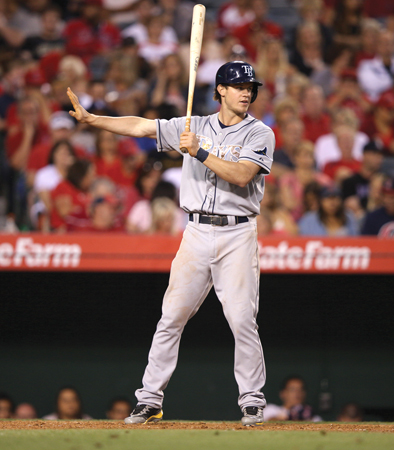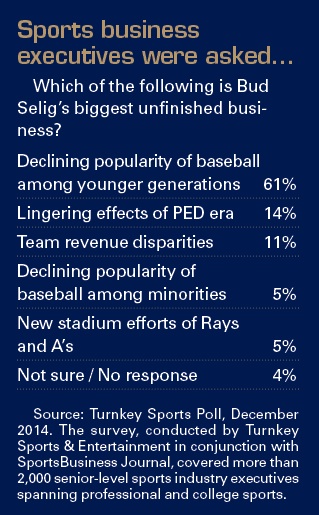Bud Selig began his tenure as MLB commissioner in 1992 under plenty of duress. After helping to push out his predecessor, Fay Vincent, Selig immediately inherited a fast-growing competitive and economic imbalance between large-market and small-market teams, and a highly contentious relationship with the MLB Players Association.
Rob Manfred, Selig’s successor, will begin his tenure with a vastly different labor landscape. But he, too, begins with a full plate of unresolved issues left over from Selig’s tenure.
 |
Rob Manfred has waited in the wings but soon will be leading the discussion on several key issues facing baseball.
Photo by: Icon |
Perhaps at the top of Manfred’s list is a pace-of-play debate that dominated much of the commissioner election proceedings this past August. Everyone involved agrees that MLB games, now averaging around three hours, take too long to complete and do not have a sufficiently crisp pace to them. That’s where the agreement ends, as executives, coaches and players alike have grappled for years on how best to balance tradition, fair play and the need to evolve and respond to
{podcast}
SBJ Podcast:
Staff writers Bill King and Eric Fisher, as well as Executive Editor Abraham Madkour, discuss Bud Selig's 22 years as baseball's statesman.
current marketplace dynamics.
MLB recently experimented with a variety of measures, such as a pitch clock and no-pitch intentional walks, in the Arizona Fall League that ultimately may work their way to the affiliated minor leagues and eventually the big leagues.
The pace-of-play issue also is intertwined with baseball’s ongoing efforts to get a younger audience. Nielsen Media Research data shows that MLB’s median viewing audience is nearly 55 years old, the highest such figure for any of the four major U.S. pro sports leagues.
Manfred also inherits decidedly thorny stadium sagas in Oakland and Tampa. In Oakland, Selig’s special committee
 |
Baseball is seeking ways to improve the pace of play as many agree that MLB games take too long to complete.
Photo by: Getty Images |
to study the A’s ballpark issue is now in its sixth year of existence, with any kind of resolution tied up in part by an ongoing legal challenge from the city of San Jose, which initially had been the desired stadium locale for A’s owner Lew Wolff. The San Francisco Giants, however, claim territorial rights over the San Jose area and have refused to allow the A’s entry into the market. San Jose has sued MLB seeking to challenge league rules governing relocation.
In Tampa, the Rays are pursuing a deal in which they would gain a long-desired ability to search potential stadium sites outside of St. Petersburg, Fla., and on the other side of the bay.
In both stadium efforts, though, it remains years before a shovel could hit the dirt, and even longer before a new ballpark could open.
Manfred, meanwhile, is a focal point in a trial surrounding the Mid-Atlantic Sports Network scheduled for March.
The Baltimore Orioles-controlled MASN is seeking to vacate an MLB revenue sharing definitions committee ruling in favor of the Washington Nationals regarding their future local TV rights fees. MASN is specifically alleging that Manfred played an improper role in what should have been an independent process.
Selig in 2005 authorized a settlement with Orioles owner Peter Angelos in which MASN’s creation was the key component of a compensation package stemming from the relocation of the Montreal Expos to Washington. But the administration of that deal, notably the Nationals’ ability to reset their rights fee payments every five years, has fallen squarely on Manfred. MASN thus far has prevailed on several preliminary grounds in the case.
Other media matters similarly loom large for Manfred. He has been actively involved with Bob Bowman, newly named MLB president of business and media, on trying to solve a long-running dilemma around in-market, live-game streaming, which to date has existed only in a few highly limited and unsuccessful test cases. If widespread resolution is found there, Manfred will also feel pressure from fans to fix often-infuriating quirks in baseball’s broadcast territorial map in which some markets such as Las Vegas and Des Moines, Iowa, are blacked out from receiving games from as many as a half-dozen teams.
Manfred also has actively pushed the concept of “One Baseball,” in which several levels of amateur baseball would become much more aligned with the operations of MLB than they have been historically. Potential moves there would include addressing current scheduling conflicts between the College World Series and MLB draft. Part of the goal in Manfred’s “One Baseball” would be to help boost youth-level participation in the sport and attract better talent.





